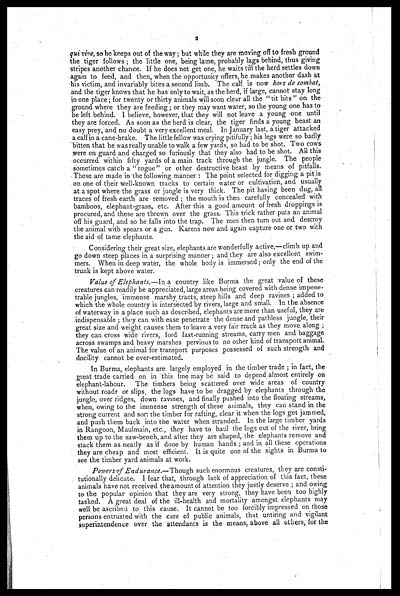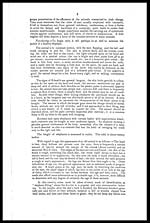Medicine - Veterinary > Veterinary diseases > Note on elephants in Burma, with a description of their equipment
(4) Page 2
Download files
Individual page:
Thumbnail gallery: Grid view | List view

2
qui vive, so he keeps out of the way; but while they are moving off to fresh ground
the tiger follows ; the little one, being lame, probably lags behind, thus giving
stripes another chance. If he does not get one, he waits till the herd settles down
again to feed, and then, when the opportunity offers, he makes another dash at
his victim, and invariably bites a second limb. The calf is now hors de combat,
and the tiger knows that he has only to wait, as the herd, if large, cannot stay long
in one place ; for twenty or thirty animals will soon clear all the " tit bits " on the
ground where they are feeding ; or they may want water, so the young one has to
be left behind. I believe, however, that they will not leave a young one until
they are forced. As soon as the herd is clear, the tiger finds a young beast an
easy prey, and no doubt a very excellent meal. In January last, a tiger attacked
a calf in a cane-brake. The little fellow was crying pitifully ; his legs were so badly
bitten that he was really unable to walk a few yards, so had to be shot. Two cows
were on guard and charged so furiously that they also had to be shot. All this
occurred within fifty yards of a main track through the jungle. The people
sometimes catch a "rogue" or other destructive beast by means of pitfalls.
These are made in the following manner : The point selected for digging a pit is
on one of their well-known tracks to certain water or cultivation, and usually
at a spot where the grass or jungle is very thick. The pit having been dug, all
traces of fresh earth are removed ; the mouth is then carefully concealed with
bamboos, elephant-grass, etc. After this a good amount of fresh droppings is
procured, and these are thrown over the grass. This trick rather puts an animal
off his guard, and so he falls into the trap. The men then turn out and destroy
the animal with spears or a gun. Karens now and again capture one or two with
the aid of tame elephants.
Considering their great size, elephants are wonderfully active,—climb up and
go down steep places in a surprising manner ; and they are also excellent swim-
mers. When in deep water, the whole body is immersed ; only the end of the
trunk is kept above water.
Value of Elephants.—In a country like Burma the great value of these
creatures can readily be appreciated, large areas being covered with dense impene-
trable jungles, immense marshy tracts, steep hills and deep ravines ; added to
which the whole country is intersected by rivers, large and small. In the absence
of waterway in a place such as described, elephants are more than useful, they are
indispensable ; they can with ease penetrate the dense and pathless jungle, their
great size and weight causes them to leave a very fair track as they move along ;
they can cross wide rivers, ford fast-running streams, carry men and baggage
across swamps and heavy marshes pervious to no other kind of transport animal.
The value of an animal for transport purposes possessed of such strength and
docility cannot be over-estimated.
In Burma, elephants are largely employed in the timber trade ; in fact, the
great trade carried on in this line may be said to depend almost entirely on
elephant-labour. The timbers being scattered over wide areas of country
without roads or slips, the logs have to be dragged by elephants through the
jungle, over ridges, down ravines, and finally pushed into the floating streams,
when, owing to the immense strength of these animals, they can stand in the
strong current and sort the timber for rafting, clear it when the logs get jammed,
and push them back into the water when stranded. In the large timber yards
in Rangoon, Maulmain, etc., they have to haul the logs out of the river, bring
them up to the saw-bench, and after they are shaped, the elephants remove and
stack them as neatly as if done by human hands ; and in all these operations
they are cheap and most efficient. It is quite one of the sights in Burma to
see the timber yard animals at work.
Powers of Endurance.—Though such enormous creatures, they are consti-
tutionally delicate. I fear that, through lack of appreciation of this fact, these
animals have not received the amount of attention they justly deserve ; and owing
to the popular opinion that they are very strong, they have been too highly
tasked. A great deal of the ill-health and mortality amongst elephants may
well be ascribed to this cause. It cannot be too forcibly impressed on those
persons entrusted with the care of public animals, that untiring and vigilant
superintendence over the attendants is the means, above all others, for the
Set display mode to: Large image | Zoom image | Transcription
Images and transcriptions on this page, including medium image downloads, may be used under the Creative Commons Attribution 4.0 International Licence unless otherwise stated. ![]()
| India Papers > Medicine - Veterinary > Veterinary diseases > Note on elephants in Burma, with a description of their equipment > (4) Page 2 |
|---|
| Permanent URL | https://digital.nls.uk/75189987 |
|---|



![[Page1]](https://deriv.nls.uk/dcn4/7518/75189986.4.jpg)
